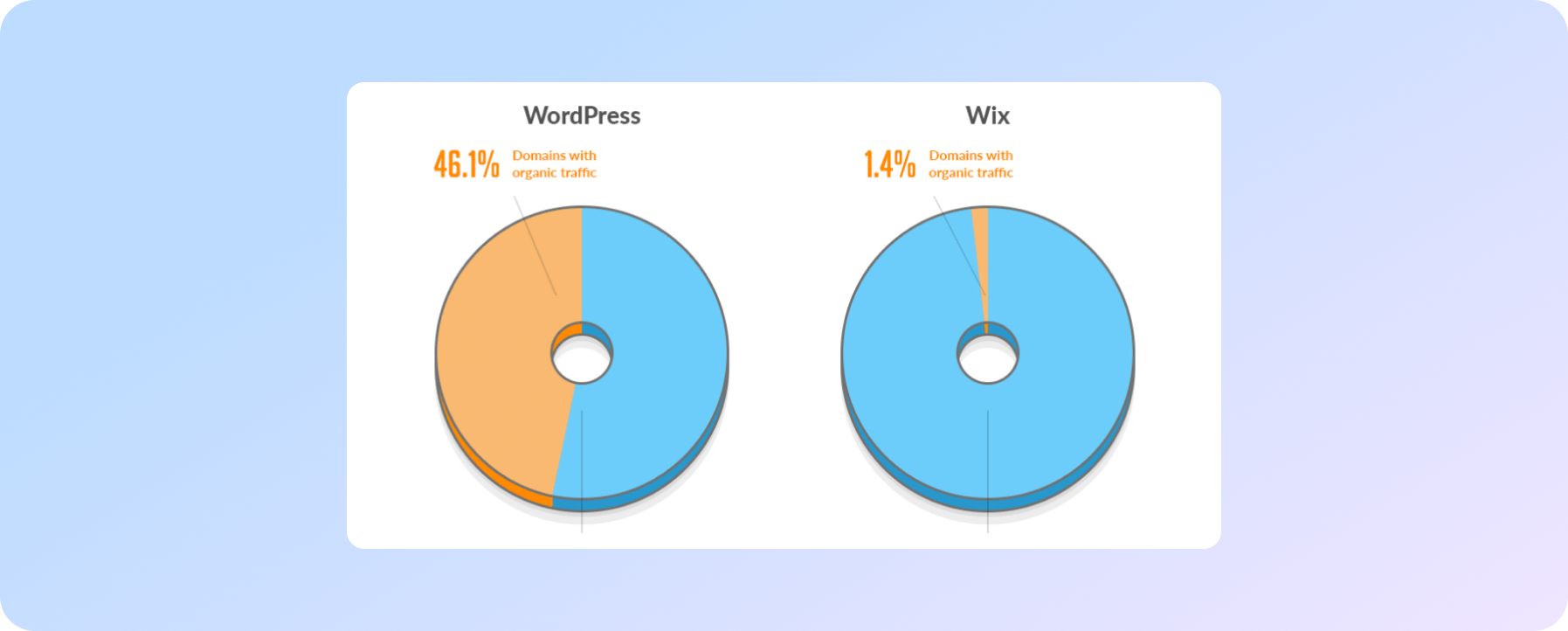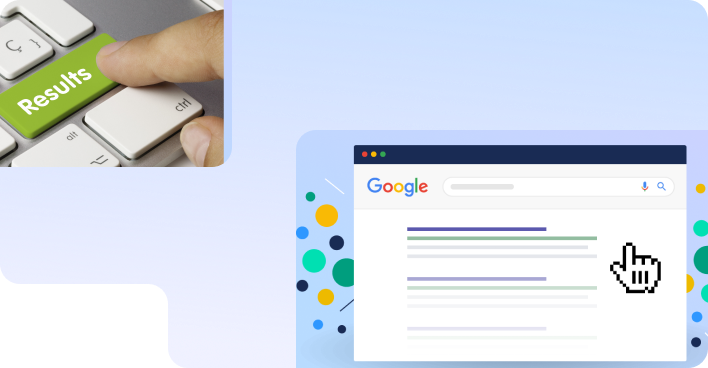No magic - just our painstaking joint work on the site
Why website Builder is not an option?
We’re doing websites development for many years, have created our own CMS. We incorporated everything we lacked not only for visually appealing websites but also for boosting sales, successful SEO, and indexing. Our portfolio includes projects built on various admin panels, except for our own CMS, such as Shopify, OpenCart, and WordPress. We have also worked with custom CMS tailored specifically to the clients' needs. It is precisely because of this experience that we want to show you the difference between content management systems and website builders, aiming to settle this question once and for good.
| Feature | Website Builder | WordPress | Custom CMS | Shopify | OpenCart |
| Cost | Paid (subscription) | Free* (for basic version) | Various (depends on developers) | Paid (subscription) | Free of charge |
| Scaling | Limited to the number of pages | Unlimited | Depends on the possibilities | Limited to the number of pages | Unlimited |
| Appearance | Choose from templates or create from scratch | Choose from themes or create from scratch | Customized as needed | Choose from themes or create from scratch | Choose from themes or create from scratch |
| Speed | Depends on server and content. Limited optimization | Depends on hosting and optimizations | Depends on hosting and optimizations | High (CDN hosting) | Depends on hosting and optimizations |
| Ease of use and customization | Easy and intuitive interface | Depends on user experience | Depends on experience and capabilities | Easy and intuitive interface | Average and requires some expertise |
| Support | Email and chat | Various support channels | Depends on the developer | Email and chat | Forum, communities |
| Number of plugins and extensions | Limited | Thousands of free and paid ones | Depends on the developer | Limited | Thousands of free and paid ones |
We can already see that the website builder lost in 4 out of 7 aspects. However, let's consider this from the perspective of why we create websites for businesses. Each resource is designed not just to showcase contact information but, primarily, to drive sales. One of the key tools for achieving this goal is SEO. Therefore, it is crucial to analyze how websites perform on different admin panels when it comes to optimization and ranking in the top search results.
Can we promote sites built on a website Builder?
We have examined several of the most critical issues encountered with website builders. What do we see? It appears that everything that should work for the benefit of the business is limited on builder.
| Feature | Website Builder | WordPress | Custom CMS | Shopify | OpenCart |
| Ability to improve download speed | Limited opportunities | Yes | Depends on the developer | Limited opportunities | Yes |
| Possibility of SEO promotion | Limited opportunities | Yes | Depends on the developer | So | Yes |
| Changes to the robots.txt file | Limited | Yes | So | So | Yes |
| Configuring redirects | Limited | Yes | So | So | Yes |
| Setting meta tags according to the algorithm | Limited opportunities | Yes | So | Limited opportunities | Yes |
| Access to site code | Limited | Yes | Full | Limited | Full |
| Page indexing success | Limited success | Yes | Depends on the developer | So | Yes |
We always make it clear that we won't promote a website built on a website builder. However, we'd be more than happy to set up Google Ads or Social Media ads. It's just that we don't want to feed you empty promises and waste your hard-earned money on something that might not yield the best results. If this is a long-term game for you, and you’re seeking to grow your business, think twice before opting for a website builder. Frankly speaking, SEO isn't its strong suit, to say the least.
Where did the trend of website builders come from?
The trend for no-code programming came to us from the USA. It looks like this: the user, not having even zero knowledge of programming, can drag the right items to create a complete working site. Only experienced users will distinguish such a web product from that made by a whole team of developers. That’s why many people, especially beginners, love website builders.
After analyzing why business owners choose website builders, we've identified the main reasons:
- No need to hire specialists: If desired, one can create such a website independently, as it doesn't require in-depth knowledge of programming or web design.
- Speed: For small businesses or startups, getting to market quickly is crucial, and with a website builder, you can put together a site in just a couple of weeks.
- Cost-effectiveness: Website builder platforms offer various plans, but typically, you can start your online journey at a very reasonable cost.
However, let's also explore why these factors can be seen as drawbacks:
- Monthly payments: In essence, after 3 years, your website will cost $324, after 4 years - $432, and so on. The cost could grow to match that of a website with a unique design and custom features developed based on your technical requirements. During the development of such a custom site, you pay just once.
- Ready-made responsive design: Most template-based solutions are already cross-browser compatible and adapt to various devices.
- Quick launch of paid advertising: Google Ads doesn't care whether your site was built with a website builder or not, so you can start advertising right away.
So, why can't a marketing strategy be effective with a website built on a website builder?
Well, we can’t forbid it, but we can certainly recommend something. Here are a few reasons why relying solely on a website builder might not be enough to build a successful digital marketing strategy:
- Limited technical functionality. Digital marketing is not just about Paid advertising; it's about a turn-key strategy. As we have already shown above, such websites have many limitations that will not allow for the full scope of SEO work.
- SEO restrictions. Since SEO is one of the many pillars of internet marketing, you certainly wouldn't want to miss the opportunity to reach an audience through organic search.
- Lack of access to code. Most website builders do not provide such an opportunity, hindering the implementation of extensive marketing strategies or custom analytics setup.
- Platform dependency. Your website relies on the platform on which it was created. This means that if you encounter issues or want to migrate to a new platform, it would essentially require starting development from scratch. At that point, the "cheap" aspect might not be so convincing :)
- Limited integration. Usually, either the platform already has ready-made integrations with external services, or forget about it. Due to the lack of access to code, manual configuration will be almost impossible.
And finally, let's be a bit harsh, but our experts' opinion is as follows:
- They do not provide a single advantage for SEO.
- As a result, these "WYSIWYG" (What You See Is What You Get) website builders seriously limit the growth of your business.
- HTML markup generated by any page builder will always be significantly heavier than HTML created by a professional web developer.
Who is the website builder for?
- Startups. To test ideas for a new product or service. The test should not cost much, but it must be done.
- Entrepreneurs. Who wanted to create an online business or support an offline point with a website? Such a site is some minimal viable product (MVP). Show it to your clients and study their reactions. Or run some PPC campaigns to get the first traction
- Project managers and marketers. For them, the website builder is an opportunity to implement their projects, for which time and money are insufficient.
- Designers. Make a product «turnkey» and watch how it works, finish it and gain experience.
- Developers. They will be able to implement their ideas very quickly without manually writing styles and interfaces
- Analytics. A quick test of a concept or hypothesis.
- Marketers. Here is a life hack! Present an idea with style. Strategies can be made on such sites instead of a huge hundred-page document.
So what? A website builder or a full-fledged CMS?
Starting any business requires weighing all the risks and rewards. The same goes for an online business. So, at the very beginning, ask yourself a few questions:
- What tasks will my website solve?
- What goals do I want to achieve with a website?
- How important is it for me to save at the initial stage? What perspectives do I want to achieve?
Website builders can indeed address certain tasks and may be a suitable option:
- Brochure website - when you simply want to introduce users to your business. The goal is not to sell, but it might be a nice bonus. Brand-related queries may be promoted.
- Landing page - IMPORTANT! Suitable for events, unique promotional offers (as a supplement to the main website), new products with limited online presence to gauge demand.
- Longread - If you need to beautifully present research, guides, or any "large" format content, a platform like Wix is perfect for this.
- Limited budget. This option is viable, and based on our experience, the workflow might look like this:
- Develop a website using a website builder.
- Launch Paid Ads.
- Generate sales.
- Develop a full-fledged website.
- Launch SEO and PPC.
- Calculate expenses and time spent.
It's great if the last point doesn't disappoint you, but statistics and experts suggest otherwise.
For all other scenarios, a website builder would not be a good idea.
We care about improving your sales :)


























